Finding Subject-Matter Experts to Review Your Content: The Ultimate Guide


Building a trustworthy brand is the only way you’ll succeed online for the long haul.
This is true regardless of what channels you use to try and capture readers and customers.
But it may carry the most importance when you’re trying to build your brand primarily through SEO.
After all, with organic search, you can’t directly pay your way to get in front of your target audience the same way you can with paid search and other channels.
Google’s algorithms have to deem you and your organization credible enough to rank organically for the questions your users have.
Without that credibility, your brand won’t rank consistently. Regardless of whether you're doing everything else "by the book" SEO-wise as far as site structure, on-page optimization etc.
One way to give your content that credibility is to commit to aligning yourself or your brand with other experts in your field.
There are plenty of ways to do this. Interviewing experts for the purposes of creating new content is one. Getting on-the-record quotes to help boost the quality of existing content (say, an expert “roundup”) is another good tactic.
Today though, I want to talk about something else entirely: finding outside experts for the purposes of conducting formal reviews of your content, which you can leverage on-site in order to improve E-E-A-T.
Leveraging subject-matter expert reviewers has become table stakes for publishers in YMYL (“Your Money or Your Life”) verticals. If you’ve used Google lately to search for any kind of major health or financial information, you’ve likely come across publishers like WebMD, Healthline or Investopedia who feature 3rd party content reviewers prominently in their editorial bylines.
But I argue it's something all brands that regularly publish content ought to consider doing. Even if what you write about is outside the explicit bounds of YMYL.
I’ll also make the case that it’s do-able for smaller ventures (or even independent niche site creators) to find people who can help with this. Even if you don’t have the editorial budgets of publishing giants like DotDash, Hearst or Red Ventures.
We’ll cover the following:
- Why expert reviewers matter, beyond just SEO & E-E-A-T (even for small brands and non-YMYL sites)
- How to determine the ideal reviewer for every piece of content you have on your site currently or are looking to publish in the future
- Where to find the experts you’re looking for and how best to reach out to them, including why cold outreach to subject matter experts often isn’t the best tactic
Let's dive in.
The Evolution of Google’s Approach to Assessing Author Credibility
One of the bigger developments over the last decade plus in Google’s refinement of what their algorithms reward has been an increased emphasis on the credibility of both individual authors as well as the broader publications they write for.
While they’re always quick to avoid giving away how much weight any of these factors actually have, both Google’s public pronouncements on the subject (particularly in their Quality Raters Guidelines document) as well as the number (and depth) of public patents filed illustrate that this is a big deal to Google. Especially in light of large-scale misinformation campaigns in recent years that have served to erode institutional trust across the Internet, not just Search.
It all seems obvious in hindsight, right?
- The highest-ranking web sites and pages ought to be written by people with demonstrable expertise in their space, honed over many years of direct experience with whatever it is the subject entailed.
- And the person behind the content should have a number of other highly credible and influential people who could vouch for that authority through reviews, recommendations and links to their body of work.
But this actually wasn’t the case on the Internet for a very, very long time.
There was a time that Google would routinely surface content that wasn’t reviewed *or* written by subject matter experts.
I should know.
In 2005, while I was still in college, I sold a handful of e-books as an affiliate and ranked a thin content site I built in Microsoft Frontpage (!) for a handful of transactional-oriented keywords in the golf niche.
I reverse engineered articles through a combination of article spinning tools and manual (semi-intelligent) re-writing and leveraged free content from other people to build out the rest of the site.
I had never picked up a golf club in my life to that point. I was very clearly not qualified to be writing this stuff!
But like a lot of black (or gray) hat SEOs, I was able to outsmart the algorithm without a whole lot of effort or credibility in the subject matter I was talking about.
Today, times have changed in all but the most historically shady of verticals.
The principles of E-E-A-T that Google first introduced back in 2014 and regularly refine on an ongoing basis represent the standards for content credibility that the algorithms seek to reward.
This means that high-ranking content usually can’t be written by just anyone. The author has to convey a high sense of credibility, including:
- First-hand experience with the subject they’re writing about
- Expertise and knowledge of the topic in a way that’s measurable
- Sufficient proof (in the form of outside reviews, recommendations, links or citations) that vouch for both their authority as subject matter experts as well as how trustworthy they are.
The problem is when these new requirements run up against the ambitions of both independent content creators and entrepreneurs, as well as the demands of publishers of all sizes.
Lots of independent creators start web sites to scratch an itch in a particular area they’re learning about or even because they see a business opportunity. Not because they’re an expert in the topic.
And larger-scale publishers want to scale ad infinitum with inexperienced (and usually inexpensive) content writers: whether they’re outsourced or on the payroll as full-time employees.
What do you do if you or your writers don’t have the kind of track record in the subjects you’re writing about?
One “hack” of sorts: find credible subject matter experts to help review your content.
It’s not a new concept.
Formal peer review of academic publications, in particular, dates back centuries.
More recently though, 3rd party experts have become a staple of sites in “Your Money or Your Life” verticals:
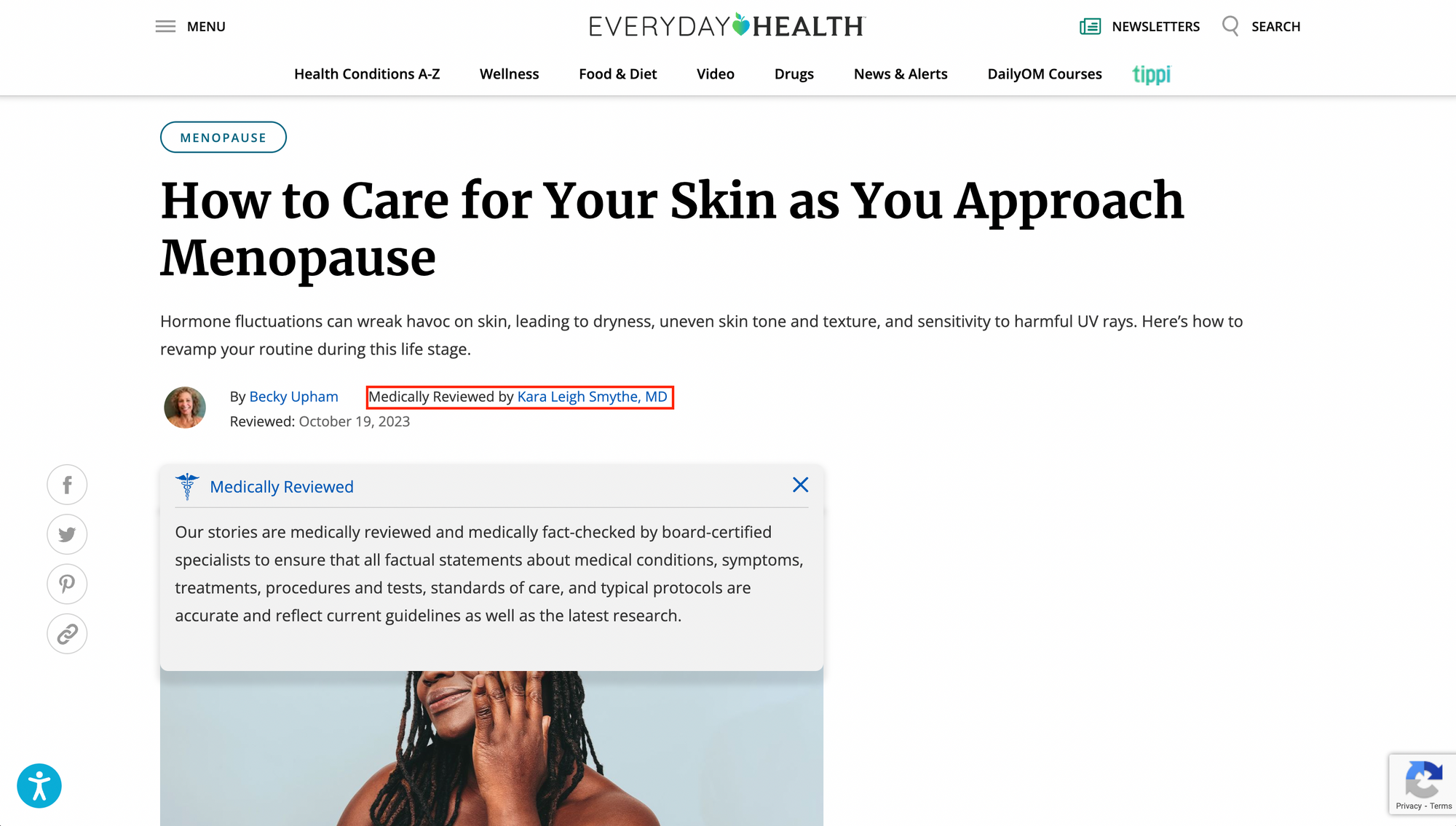
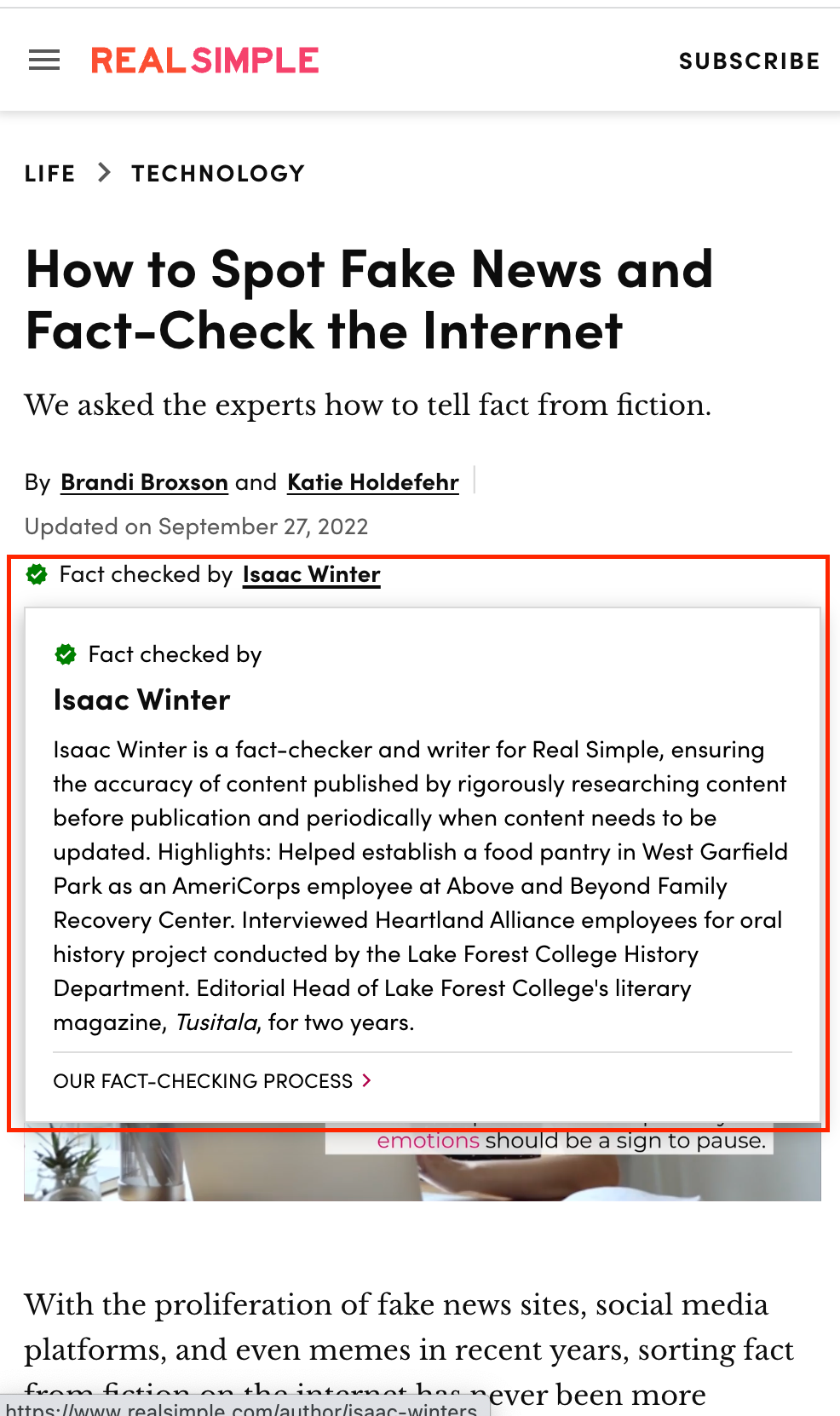
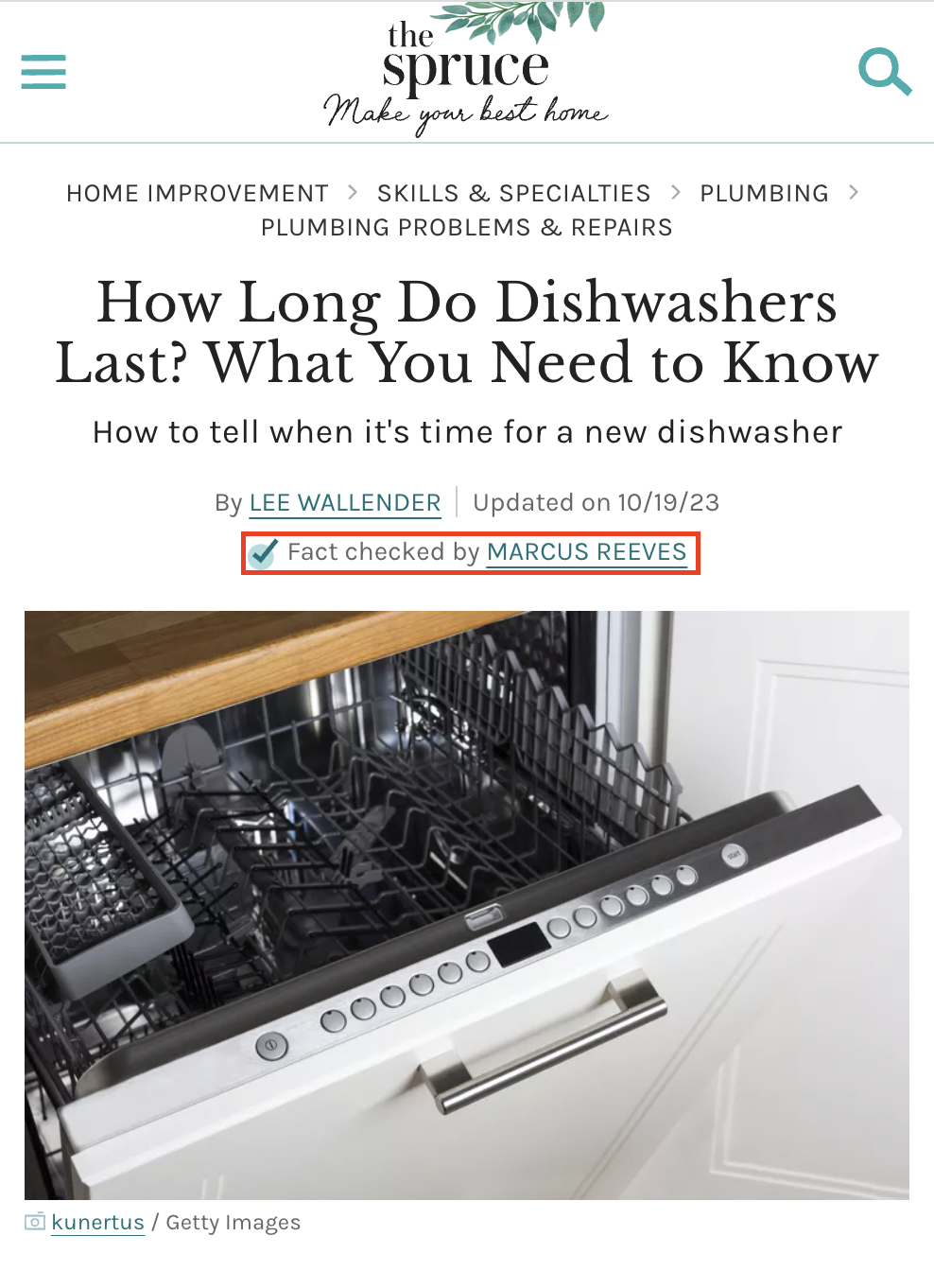
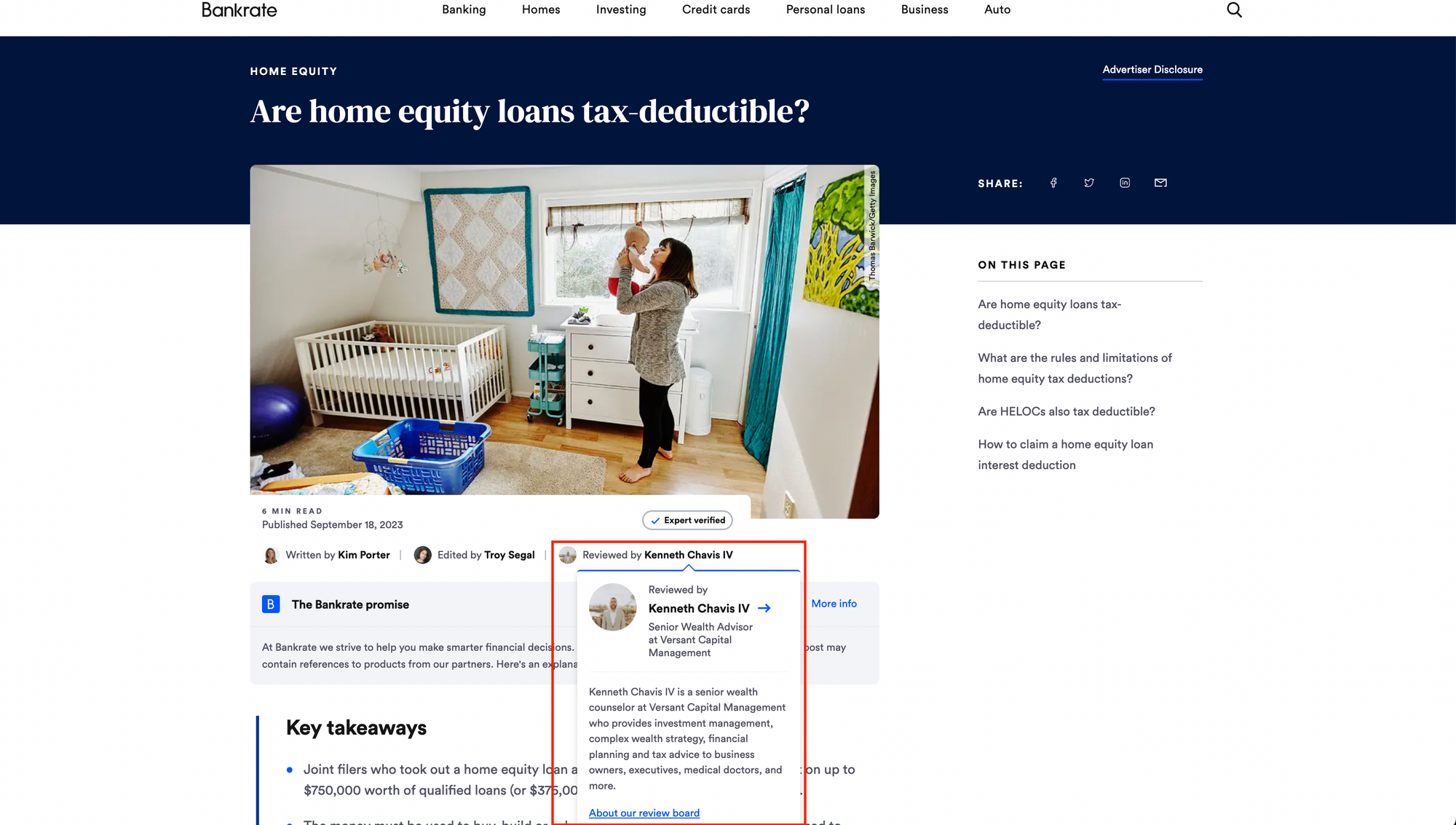
In Google’s words:
YMYL content “significantly impact(s) the health, financial stability, or safety of people, or the welfare or well-being of society,” to the point where erroneous or incorrect information might cause a serious risk of harm to the reader.
Because of that, not just anyone can write it.
Google's standards are such that this content requires higher levels of E-E-A-T than it might otherwise need in other categories in order for it to show in the SERPs.
Look at most of the top medical sites. There’s an expectation that a page discussing dosing information for a popular over-the-counter drug, for instance, needs to be written by someone with a proper medical background, be it a PharmD or even a Medical Doctor.
Same goes for financial information. You would expect an article about tax strategies for business owners to come from someone with a CFP designation or an otherwise experienced wealth manager or tax planner.
So if you’re considered “Clear” or “Maybe” YMYL, this strategy is a must.
However, regardless, of whether the content you’re publishing is YMYL or not, I still think finding reviewers is a worthy exercise for all kinds of content publishers.
Why?
1.) It's a less expensive way to make your content objectively more credible
Great subject matter experts, who are also great writers, are hard to find.
Thus, they’re expensive. Regardless of category.
Finding someone to review your content is inherently cheaper. You’re not asking them to write. You’re asking them to fact check, which is typically not as heavy a lift.
2.) If you’re not YMYL, it sets you apart credibility-wise from others in your space
One thing publishers are constantly struggling with, especially those creating content on “well-worn” topics is originality. Especially in a world where Google is actively downgrading not just spam but content deemed to not add anything new to the conversation.
By including subject matter reviewers, you give your site an aura of credibility and journalistic integrity that others sites probably don't have.
This gives you the opportunity to set the quality bar yourself in your category and stand alone in a class of your own.
3.) It allows for objectivity and an “independent” POV.
Writers are sometimes too close to the content they create. It helps to have someone come in with a different pair of eyes to provide a level of objectivity and who may be able to catch subject-matter inaccuracies quicker than someone with less expertise.
But does it actually work? Can adding legitimate 3rd party experts to your content have an impact on traffic?
In a word, yes.
From 2019 through the summer of 2023, I was responsible for recruiting and adding 20+ reviewers across four different sites: three in the financial/retirement spaces and one in the medical/legal space.
I did the initial research and legwork, helped set up onboarding calls with interested parties along with the Content team and put together bio pages that incorporated as many relevant E-E-A-T signals as possible.
Once we had a process down pat that produced results, I put together documentation that other folks on the team could use to conduct outreach in the same way. We continued to use those processes to bring on additional experts.
When I re-visited the data for each site in anticipation for an internal company presentation I was doing, I was floored. The results were far better than even I thought they'd be.
Let me briefly walk through two examples.
First though, the obvious caveat as a disclaimer:
As any SEO knows, it's impossible to attribute, with any degree of certainty, an uptick in traffic solely to one particular SEO tactic.
SEO is multi-faceted and web sites that regularly publish content have lots of moving parts. These sites were no different. We had (and the company still has) a fantastic group of marketers, designers and developers running multiple campaigns and tests simultaneously. These included (but weren't limited to): outreach-driven link building campaigns, title tag tests, CRO tests in a variety of contexts (CTAs, forms), design tests etc.
Should you choose to find your own 3rd party experts, I make no performance guarantees or assurances. Your mileage will vary based on your market, your place in the market, team size, the actual experts you get, etc.
That said, based on everything I know about the activities being conducted at the time internally, I have a high degree of confidence that this boost in credibility was a driving force in what ultimately led to significant increases in qualified traffic as well as both marketing and sales qualified leads. Many of which turned into real customers.
Put it this way: I'll provide the data. You be the judge.
1.) Financial Site (Annuity.org)
This site had been publishing since 2014, mainly on the subject of structured settlements and the sale of annuities on what's known as the secondary market. A very niche area of finance best recognized through traditional settlement buyers like JG Wentworth.
When I started working on it in 2019, they had some writers and one third-party "expert" (an independent journalist who wasn't actually a financial expert) who did some videos for them. But that's about it.
When the company's Executive Team wanted to expand the site's footprint into the broader, retirement-oriented primary annuity market around the time I came on (June 2019), it was clear that a significant boost in E-E-A-T across several fronts was needed if we were going to compete in the space.
So I spent a good chunk of time doing manual outreach and ultimately brought on a total of ten 3rd party reviewers, the first bio pages of which began rolling out in September 2020 as the reviewers started getting incorporated into our editorial workflow.
Important to note: there were no radical shifts in our content strategy or cadence, nor were there any significant additional investments being made in link building, technical SEO or other levers beyond what we had been doing up to that point.
After three separate Core Updates, traffic was up roughly 77% by the end of July, 2021.
And while there have been peaks and valleys overall (including a significant hit after the first iteration of the HCU in 2021), if we use Ahrefs traffic as an estimation, the site's average organic traffic has grown roughly 304% from September 2020.
Can all of the growth be attributed to the presence of experts?
Obviously not.
But it's unlikely to be coincidental.

2.) Medical/Legal site - (Drugwatch.com)
A site targeting a combination of health and mass tort-related queries that had first been established in the late 2000s and was hammered after the Medic update in 2018. There were a few reviewers already on-site when I started working on the site in 2019, albeit most were sourced from a network of dubious quality from a credential standpoint or were experts not quite appropriate for the content they were reviewing.
12 reviewer profiles were added in December 2019: bios, as well as attribution on a little under 100 pages.
The site saw a rough increase of 470% in organic traffic from the time the reviewers were first added to the site in December of 2019 through November of 2020.
As with the first example, this site's also gone through peaks and valleys since then.
However, traffic is now, as of Q4 2023, the highest it's ever been. And this site doesn't publish anywhere near the amount of new content that they used to.
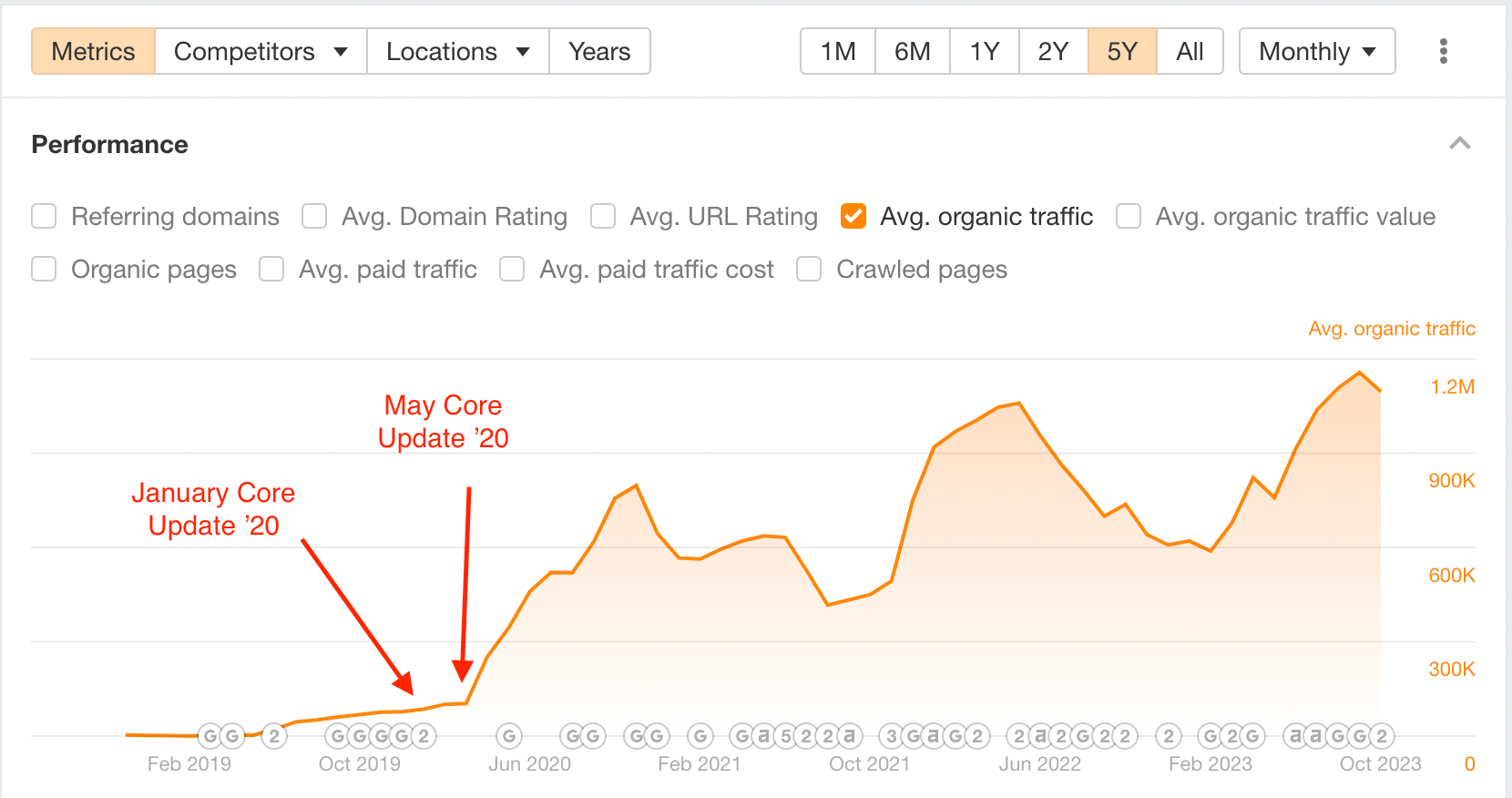
OK. So you’re sold on the importance of 3rd party experts and how they might be able to make a tangible impact.
What’s next?
Determining the Kind of Expertise You Need
Different kinds of content require different kinds of expertise.
From Google’s Quality Raters Guidelines document:
One framework I find helpful in determining the most appropriate expert to review your existing content is to run it through something I call the Credibility Quadrant:
You can use this for writers too (or anyone you put on the byline.)
But it makes especially good sense for finding the right 3rd party reviewers.
Let’s go through each part of the quadrant, from left to right, in more depth:
High Expertise, High Experience
In most cases, this will represent your ideal reviewer.
Think practicing medical doctors or attorneys, first-aid practitioners with a CPR designation, commercial real estate brokers with state licenses, ASE-certified mechanics that have worked in a luxury carmaker’s body shop for 20 years, etc.
These people have both a high degree of specialized knowledge about precisely the topic they’re writing about and the specific life or career experience doing the thing that they write about. (These two things aren’t synonymous, as we’ll get into later.)
An important point about both expertise and experience: both should be verifiable with one handful’s worth of Google searches for the expert’s name.
If you can’t find:
- Verification of individual diplomas/certifications
- Preferably some kind of public ledger of expertise:
- Published work/citations in trade journals
- Reviews, recommendations, endorsements (by customers, past employers, peers, etc.)
- A portfolio or some other public body of work owned and controlled by the expert
- Existing review work for other companies or entities (much easier to sell people who have already reviewed content for others on the opportunity; more on that later)
….then they might not be the best fit.
The more of a verifiable digital paper trail the expert has, the easier it will also be to draw relevant connections to Google from your web site to other places they've written or been cited. (More on that later, as well)
High Expertise, Low Experience
This person may actually be a diamond in the rough in terms of a contributor or content reviewer.
They may be young or inexperienced but are knowledgeable about what goes into the topic. For example, if the topic is in a more academic or knowledge-oriented field where theoretical knowledge is still valuable, these people can make great reviewers.
They also probably won’t command as much in terms of compensation as their more experienced counterparts.
Here’s a practical example:
For Drugwatch, I helped broker a deal with a fee-for-service business unit inside a well-known Pharmacy college in the U.S., after seeing them listed on the byline of Healthline, one of the bigger health information sites on the web.
We needed reviewers to do much the same thing as Healthline, WebMD, Verywell Health and the other big health information players. Particularly because most of our writers had no formal health background or training.
What the University did is essentially loan out students in its Pharmacy college to provide consultative services to businesses, including drug information requests, medical writing and, you guessed it, reviewing content for publishers.
And while the reviewers were mostly students and academics who didn’t have a lot of practical career or corporate experience (and certainly weren’t MDs), they all had the requisite training and pharmaceutical credentials (e.g. PharmD designations) to convey enough credibility and review pages about the side effects or dosage information of popular drugs like Tylenol, Viagra etc.
The result? 12 new reviewer bios.
Low Expertise, High Experience
In practice, people in this section of the quadrant could be one of two things:
- Someone with a lot of experience in a field that doesn’t require (or value) academic credentials.
Take Nick Cesarz from Drumming Review, a site that ranks well for a number of drumming-related queries, including several transactionally-oriented “best of” keywords.
According to Nick’s byline, he’s been playing drums in bands for for over 20 years. Someone like this probably has the expertise necessary to write drum set reviews that rank well on Google. Even if they didn’t graduate from Juliard or otherwise hold any other formal credential in the field of music.
- Someone who has a lot of “everyday” experience on a particular topic, despite not being credentialed
An example might be a mesothelioma survivor who writes about the day-to-day lived experience of being diagnosed with a deadly form of cancer.
Or a hobbyist mechanic who fixes old cars in his spare time.
Depending on the topic (or sub-topic therein), someone like this might be perfect.
A cancer survivor could absolutely convey the appropriate "lived expertise" for content that talks about, say, how to cope with a particular type of treatment, even though they’re probably not the appropriate choice to write about the pharmacological properties of said treatment.
Low Expertise, Low Experience
The worst fit to be on your byline, in general.
Unfortunately, this is where so many companies find themselves.
They hire cheap, generalist writers with little experience writing professionally that have no subject matter expertise about what they’re writing about to draw from.
And if it's a topic that doesn't require a lot of inherent authority to write about, maybe that can still work.
But in most cases, the bar is being raised across the board.
Taking Stock & Finding Your “Ideal Reviewer” For Each Page
First, it’s time to take stock of your existing content and define who you feel would be the “ideal expert” for each page or content category.
Export a list of all of the content from Google Analytics or Search Console that you're looking to find reviewers for and categorize each page.
Then, prioritize them based on whatever KPIs are most important to you, whether that’s existing traffic, traffic potential, leads, MQLs/SQLs, revenue etc.
If you have a small site with a singular focus, this shouldn’t be too hard.
If you have a larger site covering multiple topics, you’ll want to categorize your content by topic or specialty area and look for reviewers to cover certain areas.
For example, a larger personal finance sites may have hub sections like:
- Credit
- Taxes
- Real Estate/Home Buying
- Banking
- Investing
- Etc.
While a tax professional *could* review and fact check some real estate content (let’s say, about capital gains tax implications for first-time home sellers), you probably want someone like a real estate agent to tackle questions about home appraisals, or how to stage a house.
Once you’ve exported and categorized your pages, create a new tab in the same sheet that contains each category, followed by two columns:
- Desired Credentials. What specific certifications, degrees or background should this person have?
- Desired Career background. What kinds of places (or even specific companies) should they have worked? What would their job titles be? What would the descriptions of those jobs look like?
I wouldn’t spend a ton of time filling this out. They don't have to be detailed personas. Just a rough benchmark of what you're looking for.
Here’s an example with the case of that fictional personal finance site in mind:
If you’re still having trouble thinking about what your ideal reviewer looks like, ask yourself these questions:
- If I was researching this topic for myself or a family member, who would *I* trust to give me the most sound information?
- What do the SERPs look like as far as the highest ranking pages on this topic? Who wrote them? What does their background look like? Did anyone else contribute to the topic, as a guest or as a 3rd party reviewer? What do their credentials look like?
Once you’ve got this list mapped out the way you want it, you’re ready to start looking.
But…..heed this warning before you start.
Why Cold Outreach Isn’t The Place to Start
It’s tempting to just go to LinkedIn or start Googling individual practitioners in a given area and ask them if they’ll help review your content. Especially if you don’t have connections to anyone personally who might be able to help.
But let me give you three reasons why that’s a bad idea. At least to start.
1.) Most of the best subject-matter experts are busy. And don’t usually need the money!
Many experts (especially highly paid medical and financial experts) that are worth targeting are busy with their day jobs full-time and don’t have much spare time to pursue additional work. Especially if that work is lightly paid or unpaid.
Whenever I (or my co-workers) did this with my last company, we’d usually get back some form of “no bandwidth” or “don’t have time” in response. It’s very common.
2.) Your target reviewer doesn't actually know what you’re asking for.
“Reviewing content? What’s that?”
A lot of people we reached out to in previous attempts weren’t entirely clear what we were asking them to do: what the scope of the engagement was, what kind of content they’d be reviewing etc.
This presented a challenge with people who have never done this.
It required a lot of back-and-forth, even if we were ultimately able to bring them aboard.
3.) Some experts who appear to be credible on the surface….aren’t
Vetting an expert’s credibility can be a time-consuming challenge and isn’t always straightforward.
There’s also the very real other side of this equation. If you’re not a well-known brand, it might be harder to attract the kind of person you want with cold outreach.
So if not cold outreach, where *do* you start.
Competitors
This is the lowest hanging fruit and where I personally have had the most success in finding new content reviewers.
I don’t just mean reviewers who are *like* who your competitors have. (though that can work too)
I’m talking about reviewers your competitors might already have.
Find their contact info and ask them if they’ll do the same work for you.
One secret I’ll impart on you from my time doing this in the YMYL world.
Almost all of the big publishers with “review boards” (specifically places like Dotdash and Red Ventures) hire content reviewers as contractors. They’re not employees.
And those contractors often do this work for many, many people. Not just the big brands.
You can Google a few of the most popular reviews and see for yourself. If you’re a reputable site, they’re happy to talk to you.
Which is one of the reasons why this works so well: you don’t have to sell them on the value of reviewing content. This makes the pitch more compelling for the individual to receive and the onboarding process much easier.
You’re not pitching a cold prospect and you don’t have to spend a lot of time setting up the “ask.” They know what’s expected because they’ve done the same kind of work before for other companies.
The second big reason is that they already have an extensive digital footprint.
This means that:
- The “vetting” of the expert that you might otherwise have to do yourself has already been done by another credible party
- You as a publisher can leverage this "digital footprint" of other, authoritative sites by association with your own brand.
For example, you can talk extensively about the fact that this person (whom, assuming you can bring them on board) who wrote for Famous Site X or Y is now reviewing content for your brand, or use their logo.
On the back-end, you can also use schema to help Google understand the nature of the relationship by utilizing SameAs schema on each reviewer’s bio page and include links to their published bio pages elsewhere.
Even better if they’re included in Google’s Knowledge Graph.
Beyond existing competitors, where else can you look for reviewers?
Networks and Freelance Boards
Another way to find reviewers is to tap into existing networks.
These could be:
Freelance boards
People immediately think of sites like Upwork and Fiverr. Or the premium “1-3% of talent” places like Toptal.
But there are also specialized platforms like Kolabtree that are geared more towards medical and scientific experts that might yield better results. Especially if you’re in a high YMYL niche.
Networks of Verified Experts
There are also independent companies that provide experts as a service.
This is most notable in the health and medical world. The Drugwatch example I talked about is one. But there are other universities that operate these kinds of groups.
There may be opportunities like this in your niche if you look for them.
Keep in mind though that if you do pursue these groups, that before you sign up for any agreement, that you get a clear sense of:
- Who the actual reviewers of the content would be
- What their credentials are
- Whether or not you can use their information to populate bio pages on-site and include them on your byline as reviewers
Expert Witness Databases
Here’s another untapped opportunity to find potential experts or even networks of experts.
Courts often require expert witnesses to serve as objective third parties in relevant trials. Depending on their area of expertise, it can be pretty lucrative.
But many of these experts also offer broader consulting services for people who might need to tap into their expertise for other reasons.
For example, this company I found on JurisPro, which specializes in forensics and expert witness consulting in a wide variety of disciplines, also offers testing and product development services.
Perhaps more importantly, they also work with standards writing organizations and the media.
So it’s not too far of a leap to think they might be willing to review your web site’s content if you were to ask.
Tactics to Use in Outreach
Now that you’ve compiled a list of outreach candidates, it’s time to begin the process of reaching out to your candidates.
If their contact information is readily available, great. If not, use a tool like ContactOut to try and uncover the e-mail address of your intended recipient from their LinkedIn profile.
With your e-mail itself, in my experience, brevity works best. You want to make your pitch as succinctly as possible.
Here’s a variation of a template that worked well for me. First, for potential reviewers who you know have done this work for other sites:
Hi <intended recipient>,
I’m <your name> from <your company>. We’re the publishers behind <your site>.
We’re looking for experts like yourself to help periodically review and audit content on a freelance basis as part of our Review Board <include a link to where you feature other reviewers if you have one>
I found your contact information through several articles you had reviewed for <other site> and thought I’d reach out to you.
Is this something you might have interest in? If so, let me know and I’d be happy to discuss the particulars and any questions you might have.
Thanks in advance!
<your name>
Alternatively, if you’re reaching out to someone cold, you’ll probably need to supply a little more context as to what the opportunity entails.
One good way to do this is to prepare a one-sheeter with additional context about the opportunity, including answers to frequently asked questions, such as:
- How much content the reviewer would be expected to look at in a given period
- The kind of content the reviewer would be looking at and the expertise you, the publisher are looking for (to ensure that it’s a good match and that the reviewer is comfortable enough with the topics you’re sending them)
- Expected turnaround times (in what timeframe does the reviewer need to have each piece of content returned to Editorial)
- Who the reviewer’s point of contact will be
- Process questions (e.g. How the reviewer should provide edits - in a shared environment like a Google doc or as separate Word docs)
- Whether they’ll be featured on the byline of the web site (they will!)
(You should also be aware of how much you can pay per article reviewed. And yes, you need to be willing to compensate reviewers for their time the same way you would pay a freelance writer or editor.)
Your initial e-mail to this person could look something like this:
Hi <intended recipient>,
I’m <your name> from <your company>. We’re the publishers behind <your site>.
We’re looking for experts like yourself to help periodically review and audit content on a freelance basis as part of our Review Board <include a link to where you feature other reviewers if you have one>
You wouldn’t be expected to write or edit content for grammar but be reviewing content mainly for subject matter accuracy and to ensure we’re following the best practices in <name of field>.
Is this something you might have interest in? If so, let me know and I’d be happy to discuss the particulars and any questions you might have.
Thanks in advance!
<your name>
Onboarding
From here, if you get a positive response, send your prospect the one-sheeter and ask if you can get them on the phone for a quick 30 minute phone call. Answer any questions to the best of your ability.
One thing you can do to help build trust between the two sides if you’re meeting resistance: offer to pay for a sample of the reviewer’s work. This way, they can get a feel for your process and the kind of content they’d be looking at. And you, as the publisher, can get a sense of whether or not they’ll actually provide actionable suggestions.
Send over a sample page and ask the reviewer to look it over and make suggestions (preferably if you know there may be some inaccuracies) and see what they come back with.
From there, you can choose to work together or not.
Once they agree, collect the appropriate paperwork from them for tax purposes as you would with any contractor (W-9 and 1099-NEC for U.S.-based contractors) and ask for them to supply you with a recent headshot and a brief bio.
You’ll use this information to populate their bio page.
Once you’ve got your experts secured and incorporated into your Editorial workflow, there’s a whole host of things you can do to help accentuate their presence throughout the web site as you would with your other editorial contributors. But I’ll save that for a future article.
Takeaways
To summarize:
- Collaborating with subject matter experts to review and enhance content is a valuable strategy, irrespective of your niche.
- I've seen the introduction of expert bios and their inclusion as part of on-site content on two separate sites lead to significant lifts in traffic that held for the long term. (Although as with ascribing lifts to any single SEO element, it's important to remember correlation =! causation etc.) Do your own experimentation.
- Identifying the right kind of expertise for different types of content is essential. Use the "Credibility Quadrant" and the Ideal Reviewer spreadsheet to help find the most suitable reviewers for your content before you start reaching out to people.
- Once you're ready, put together a well-structured outreach plan and a streamlined onboarding process to maximize success. Reach out to people who have signaled their interest in doing this kind of work first before trying for those who may just have the on-paper credentials you’re looking for.
Good luck! And feel free to reach out if you have any questions. I'll add pertinent questions here periodically if there's enough interest.
